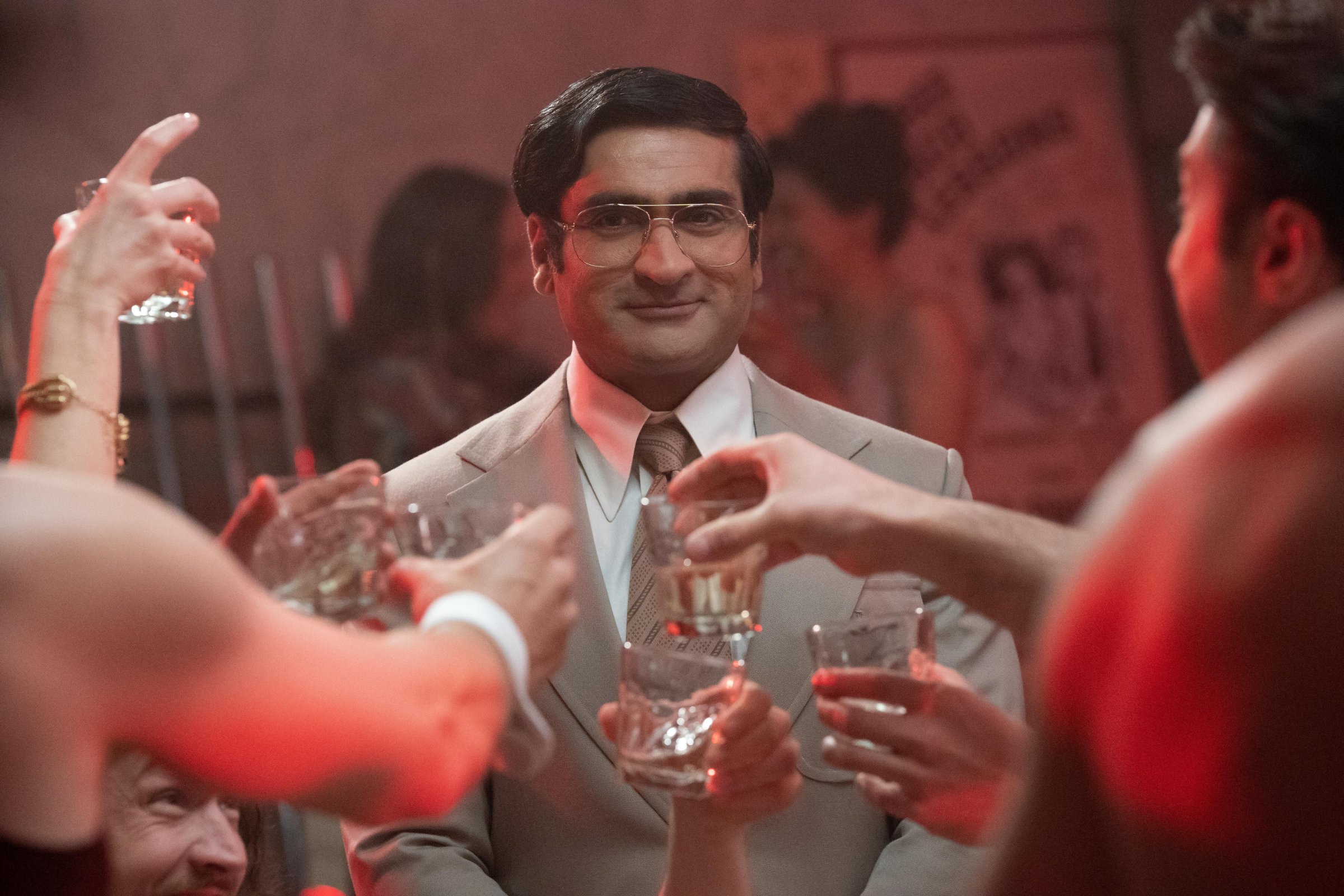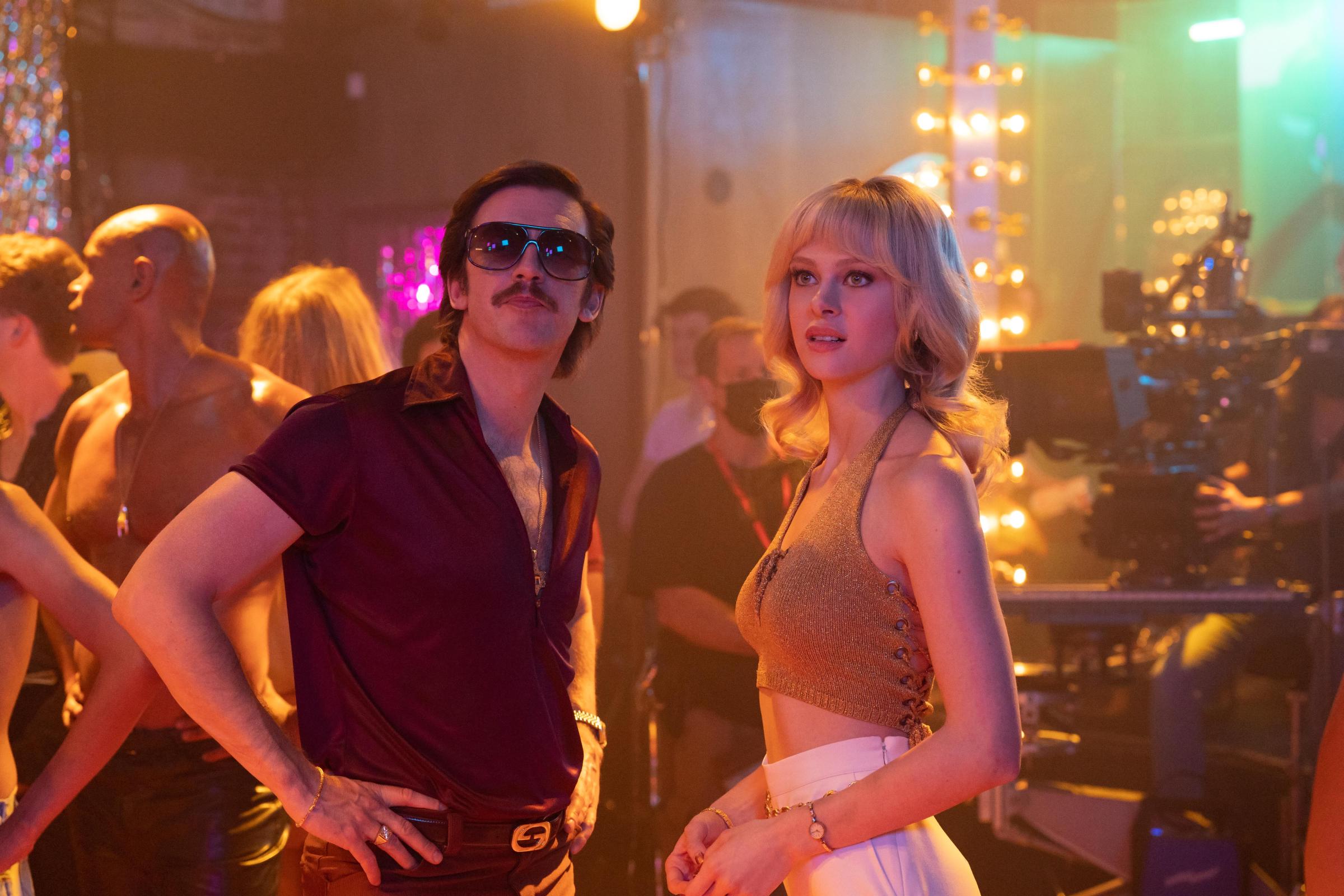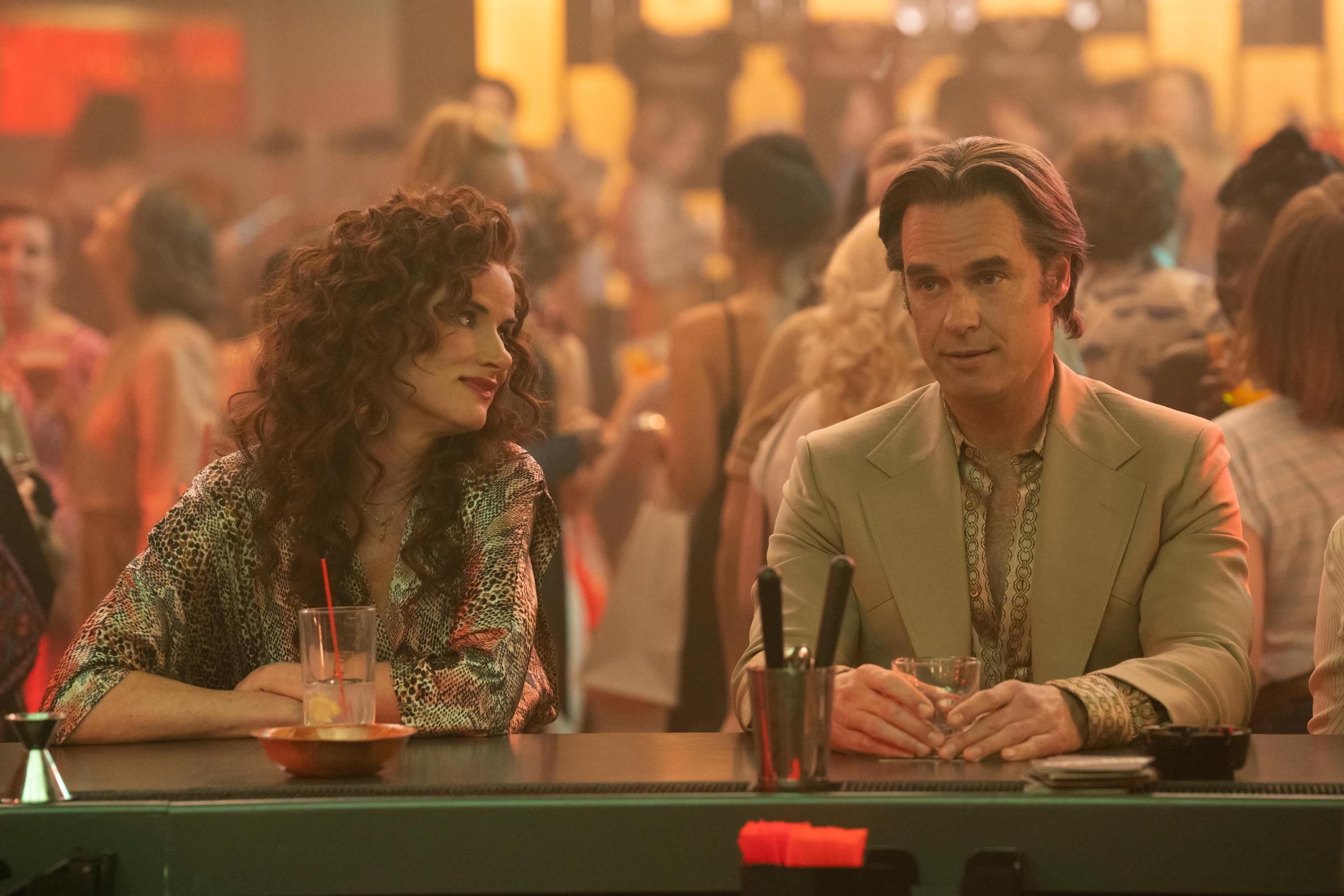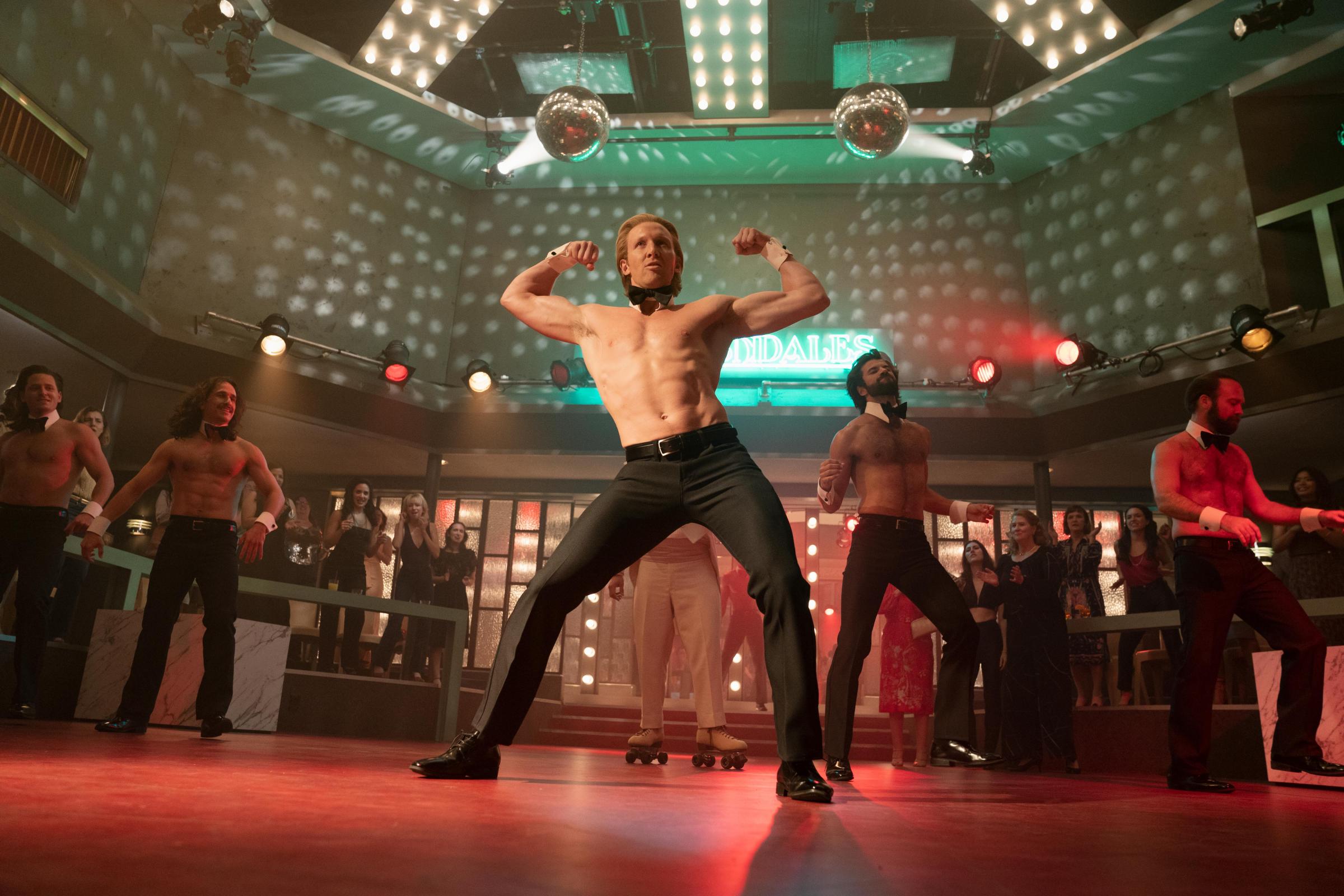
Welcome to Chippendales has all the elements of a great workplace comedy—a charismatic cast, offbeat characters, an unconventional setting. But the show, premiering Nov. 22 on Hulu, is actually a true-crime docudrama based on a book called Deadly Dance: The Chippendales Murders by K. Scott Macdonald and Patrick MontesDeOca. That complicates things, resulting in a romp through 1980s L.A. nightlife that makes you feel a bit guilty for enjoying it so much.
For those who didn’t live through that era or catch one of two recent documentary series (discovery+’s Curse of the Chippendales and A&E’s Secrets of the Chippendales Murders) or the acclaimed podcast on the pioneering all-male strip club for women, the story begins with Somen Banerjee. When we meet him, Somen, an Indian immigrant played as an ambitious yet quietly tortured soul by Kumail Nanjiani, is working the register at a Southern California gas station convenience store, where racist customers steal beer and make fun of his name. Offered a promotion to manage a chain of stations, he demurs. It turns out that by socking away a remarkable 90% of his meager income, Somen has amassed enough savings to buy his own business, a backgammon club in West L.A. He christens it Destiny II—to imply that there’s already a successful Destiny I somewhere—and gives himself a new name as well: Steve.

At first, the bar sits mostly empty. When the seemingly well-connected promoter Paul Snider (Dan Stevens) walks in one night with his Playboy Playmate wife Dorothy Stratten (Nicola Peltz), a flailing, cash-strapped Steve promises him a 25% stake in the business in exchange for getting celebrities to visit the club. Paul quickly turns out to be a fraud—and, tragically, worse. But before their acrimonious parting, a night out dancing with Paul and Dorothy at a gay club, where male go-go dancers gyrate and strip, gives the preternaturally stiff Steve the idea that will become Chippendales. Dorothy contributes the suggestion that they dress the bare-chested men in collars and cuffs like the ones Bunnies wear at the Playboy Club.
Chippendales’ core creative team comes together once she and Paul are out of the picture, with each new staffer adding their own ingenious tweaks to Steve’s concept. Nick De Noia (The White Lotus breakout Murray Bartlett, unrecognizable without his Australian accent and facial hair), a choreographer and filmmaker who’s eager to mention his two Emmys, blusters his way into the women-only club and leaves with a gig devising campy dance numbers for the Chippendales. A shrewd, young accountant, Irene (Annaleigh Ashford), captures Steve’s profit-motivated heart by teaching him how to save money on alcohol by filling drinks with ice. Finally, there’s Denise (Juliette Lewis), a brassy, persistent club regular who spends weeks trying to talk Nick into getting her hired. It turns out she’s something of a fashion designer; those tear-away pants that the guys wear, briefly, onstage are her perverse stroke of genius.
Read More: From Super Pumped to Inventing Anna, Docudramas Are Taking Over TV. Here’s Why That’s Worrisome
If Chippendales were a comedy, it could easily wring many seasons’ worth of hilarity out of this mismatched central foursome and their sexy, silly workplace. Episodes are punctuated by the wonderfully strange performances Nick dreams up, from stripping bellhops at a posh hotel to a Rocky-Horror-indebted rock opera about a mad scientist Frankensteining together the perfect male specimen. Steve and Irene would be, as they are in early episodes, the vanilla pencil pushers in love to Nick and Denise’s wild, eccentric creative duo. The ambiguity in the latter pair’s relationship, further complicated by Nick’s ravenous pursuit of men following his divorce from actress Jennifer O’Neill, would make for a perfect multi-season will-they-or-won’t-they plot. All of the principals are smartly cast and superb; it’s hard to imagine anyone but Lewis bringing such chaotic magnetism to Denise, or anyone besides Nanjiani nailing Steve’s explosive mix of uncompromising determination, familial guilt, inferiority complex, and outsider’s awkwardness.

But the true-crime elements, from desperate characters to bursts of violence, are present in the story from the beginning. By midway through the eight-episode season, tensions between the arrogant, overbearing Nick and his insecure boss, whose temper flares up in the face of perceived humiliation, have mounted to dangerous levels. And the show becomes something darker and sadder than those who go in cold to Chippendales might expect after an episode that finds Irene exclaiming “I love cocaine!” with white powder all over her nose when Denise coaxes her into trying the drug on a wild night out.
Co-showrunners Jenni Konner and Robert Siegel—working with top-shelf directors such as Late Night’s Nisha Ganatra, WandaVision’s Matt Shakman, and Gwyneth Horder-Payton (Pose) as well as writers including playwright Rajiv Joseph, Annie Julia Wyman (The Chair), Jacqui Rivera (The Get Down), and Mehar Sethi (BoJack Horseman)—smooth the transition by maintaining a quick pace and a lively tone. Unlike Siegel’s other 2022 Hulu true-crime docudrama, Pam & Tommy, it accomplishes this without insulting or condescending to its characters. There are wonderful secondary performances from Stevens, Robin de Jesús, and, as a Black dancer who doesn’t find the anti-racist ally he expected in Steve, Quentin Plair. Instead of recycling the same New Wave hits dredged up by so many other ’80s-set shows, a soundtrack of disco, “Footloose,” and British glam-pop bands like T. Rex and Sweet feels true to the club’s clientele. The kaleidoscopic title sequence is a work of art unto itself.

Along with the workplace sitcom that could’ve been, there’s also a more artistically ambitious, Mad Men version of Chippendales that remains unmade. That miniseries might have slowed down, or expanded over multiple seasons, to spend more time getting to know the dancers as individuals or dug deeper into the lives of the women in the audience, as the sexually liberated, feminist ’70s gave way to the backlash ’80s. It might’ve contextualized Steve’s materialism and obsession with success within an era of boundless ambient optimism about the American economy and capitalism in general. Certainly, a more historically engaged show would have made more thoughtful connections between Nick’s queerness, Steve’s homophobic policy prohibiting men from attending Chippendales performances, and the onset of the AIDS crisis.
Instead of fulfilling its potential for greatness, Chippendales settles for being merely good—and is sure to leave some viewers with the uncomfortable sense of having delighted in a dramatization of real people’s death and heartbreak. But its true-crime exploitation quotient doesn’t even approach that of Ryan Murphy’s recent smash Dahmer—Monster or the Renée-Zellweger-fat-suit burlesque of The Thing About Pam. And this year’s barrage of grim, dutiful docudramas make it hard to complain about one that’s enjoyable and propulsive and calibrated for the female and queer gaze from start to finish. It may not be an epochal masterpiece, but in a fitting tribute to its subject, Welcome to Chippendales sure is entertainment.
More Must-Reads from TIME
- Cybersecurity Experts Are Sounding the Alarm on DOGE
- Meet the 2025 Women of the Year
- The Harsh Truth About Disability Inclusion
- Why Do More Young Adults Have Cancer?
- Colman Domingo Leads With Radical Love
- How to Get Better at Doing Things Alone
- Michelle Zauner Stares Down the Darkness
Contact us at letters@time.com